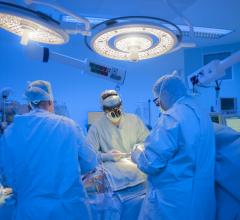October 7, 2013 — Emergency surgery and advanced cardiac disease are risk factors for major adverse cardiac events (MACE) after noncardiac surgery in patients with recent coronary stent implantation, according to a study published by JAMA.
“Approximately 600,000 percutaneous coronary stent procedures are performed annually in the United States. Twelve to 23 percent of these patients undergo noncardiac surgery within two years of coronary stent placement,” according to background information in the article. Noncardiac surgery after recent coronary stent placement is associated with increased risk of adverse cardiac events. Delaying necessary noncardiac surgery can pose a clinical dilemma for a large number of patients.
“Guidelines recommend delaying noncardiac surgery in patients after coronary stent procedures for one year after drug-eluting stents (DES) and for six weeks after bare metal stents (BMS). The evidence underlying these recommendations is limited and conflicting,” the study reported.
Mary T. Hawn, M.D., M.P.H., University of Alabama at Birmingham, and colleagues conducted a study to determine risk factors for adverse cardiac events in patients undergoing noncardiac surgery within 24 months of coronary stent implantation. The study included 41,989 Veterans Affairs (VA) and non-VA operations performed within two years of a coronary stent implantation between 2000 and 2010. The researchers examined the association between timing of surgery and stent type and major adverse cardiac events (MACE). The primary outcome for the study was a composite 30-day MACE rate of all-cause mortality, heart attack and cardiac revascularization
Within 24 months of 124,844 coronary stent implantations (47.6 percent drug-eluting stents (DES), 52.4 percent bare-metal stents (BMS)), 28,029 patients (22.5 percent) underwent noncardiac operations resulting in 1,980 MACE (4.7 percent). The time from stent placement to surgery was associated with MACE for surgery in the first six months after the stent procedure, but not for surgery more than six months after the stent procedure. The three factors most strongly associated with MACE were nonelective surgical admission, having a heart attack in the six months preceding surgery and a revised cardiac risk index score (comprising independent variables that predict an increased risk for cardiac complications) greater than two.
The MACE rate was 5.1 percent for BMS and 4.3 percent for DES. Stent type was not associated with MACE for surgeries more than six months after stent placement.
A case-control analysis of 284 matched pairs of patients found no association between cessation of antiplatelet therapy and MACE.
The authors noted several considerations need to be given to these findings, including that the study sample comprised primarily older male patients, thus limiting the generalizability to women or younger men; the clinical factors that influenced stent selection were largely unavailable so they could not be accounted for in the models, and, accordingly, the results could be confounded by those factors; and many patients underwent more than one percutaneous coronary intervention (procedures such as balloon angioplasty or stent placement used to open narrowed coronary arteries) procedure during the dates of the study, which could result in misclassification bias for time from stent placement to surgery.
“The approach for patients with BMS should not change; these patients usually can undergo surgery within six weeks after coronary stent implantation with very low risk of stent thrombosis. For patients with DES, surgery performed at least six months after DES implantation appears to carry low risk for stent thrombosis, especially with contemporary, second-generation DES, which have more biocompatible, durable polymer coatings. Hence, nonurgent operations should be postponed until six months after stent implantation,” reported the study.
For more information: jama.jamanetwork.com


 January 15, 2026
January 15, 2026 









